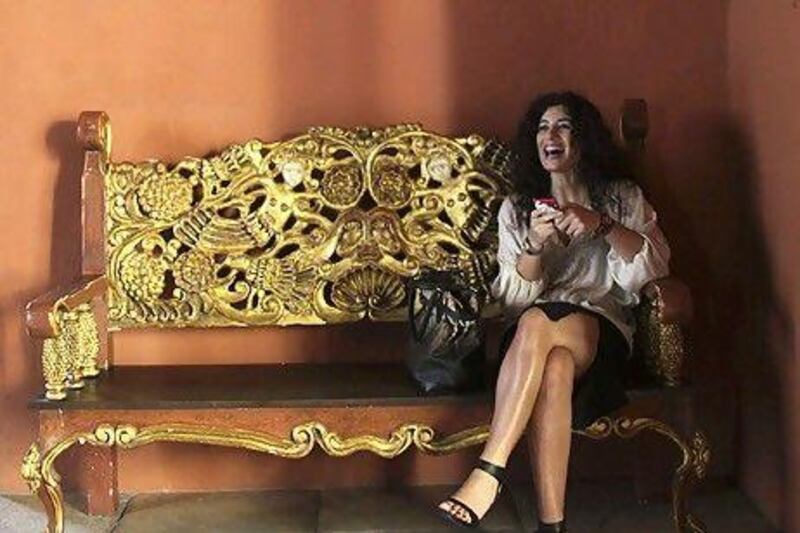Anyone who has come across the Lebanese polemicist Joumana Haddad will know that when she calls her new book Superman Is An Arab, it's not meant as a compliment.
After all, this is the woman whose last book, I Killed Scheherazade: Confessions of an Angry Arab Woman, sold thousands of copies across the world when it came out three years ago, while sparking threats of violence and hate mail, which she still receives regularly.
Translated into 13 languages, it might have been written as a call to arms for Arab women to change their lives but, oddly enough, it was also seized upon by western women.
"That was a strange, strange thing," says the 41-year-old. "I'm writing about my own society and experiences. But when I travelled around the world, women in France, Germany, Italy and Latin America came to me and said they were feeling the effects of this macho, patriarchal society, too. That's the beauty of literature, isn't it? You think your problem is specific but, perhaps, it's universal."
Still, Haddad's focus remains firmly on her own experiences. The "Superman" analogy comes from her view that a large number of Arab men believe they need to be hyper-masculine "men of steel", rather than show their vulnerabilities or share their problems.
As she writes in the remarkable introduction to Superman Is An Arab: "That is when leaders become despots, bosses become slave owners, believers become terrorists and boyfriends become oppressors."
But Haddad never rants: her real knack is to make her books not only persuasive but readable and enjoyable, too. Somehow, she makes the serious issues of Arab gender politics great fun.
"Humour is one of my weapons, definitely," she agrees. "I mean, if I didn't have a sense of humour I'd be the most unbearable person on the face of this planet! I wake up every day as if I'm going to war. I face so many challenges and frustrations, which many other women do. But having grown up in a country torn by civil war, I understood that you have to make fun of what is most painful to overcome it."
Haddad's relationship with Lebanon is intriguing. Among her various interests, she edits the cultural pages of An Nahar, the Arabic daily newspaper, teaches at university and does consultation work for the International Prize for Arabic Fiction - all in a country that she believes hates her.
"Some men ask me why I complain so much," she says. "They say to me: 'Well, at least Lebanon isn't Saudi Arabia.' But why say that? Why compare ourselves to worse countries? Why not feel inspired by countries that have gone farther in the fight for women's rights?"
She also takes issue with the notion that Lebanon is the most obviously "occidental" country in the Middle East.
"It's really not about whether I can go dancing until 4am," she argues. "It's about how I can't give my nationality to my children because I am a woman. It's about laws that don't protect me from violence or rape."
Haddad is a realist. She's not about to start suggesting her books can change the world. But the letters of support she receives every day give her hope.
"There is a fear of saying these things out loud," she says. "People don't want to challenge the status quo. But many Arabs - men and women - feel like I do, that people should be able to express themselves freely in whichever way they choose. I don't think mine is a lonely voice in the wilderness. It's just that my 'microphone' works."
In Superman Is An Arab, proof of that comes from the many anonymous testimonies submitted to her, which are printed at the end. One says: "I want to be braver. But being brave here would cost me what I cannot afford."
No wonder, then, that Haddad has a simple answer to the question about what she hopes for her new book. "That it is read," she says. "That's all."
• Superman Is An Arab: On God, Marriage, Macho Men And Other Disastrous Inventions (Westbourne Press) will be out tomorrow
Joumana Haddad on religion
"There is nothing wrong with being spiritual. On the contrary, I admire it. We all believe in something. We need to, I think. But we really need to stop parroting words that are empty of meaning, take a look at these institutions and have the courage to ask if this is really what we consider as our ideal, our way of being better.
"Think about what it really means to be a human being. It's beautiful, isn't it? It's about love. It's about being generous and respecting other people, and being honest and decent. It's about humanity, not about whether you go to the mosque or the synagogue or the church every day.
"When I ask my students to think about how their religion asks them to live their life and how that might relate to what they actually believe – in terms of human rights, equality and so on – you see the spark in their eyes. I'm not rubbishing what they may or may not believe, because each person has to find their own way. It's not easy."






